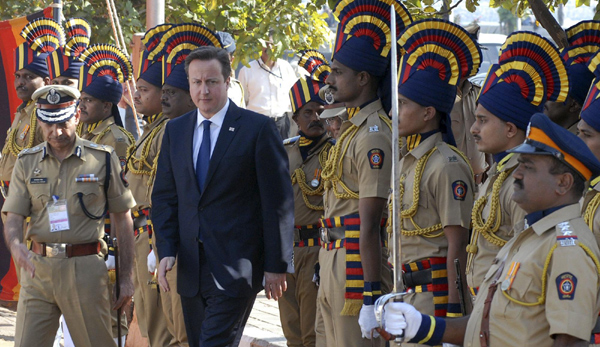Britain to pry open Indian trade gates
Updated: 2013-02-19 09:39
(China Daily/Agencies)
|
|||||||||||
British Prime Minister David Cameron arrived in India on Monday with what he called Britain's biggest ever overseas business delegation for a three-day visit clouded by a corruption scandal.
His trip comes amid a raging controversy over India's procurement in 2010 of 12 helicopters from Anglo-Italian firm AgustaWestland in a $748 million deal.
 |
|
Britain's Prime Minister David Cameron arrives to pay tributes at a memorial dedicated to policemen who lost their lives in November 2008 attacks, in Mumbai Feb 18, 2013. [Photo/Agencies] |
After an investigation in Italy suggested kickbacks were paid via middlemen to secure the deal, India has taken steps to cancel the contract and started its own police investigation.
The British prime minister is likely to face further questions about the probe - the helicopters are being manufactured in southwest Britain - with the Indian government keen to be seen acting tough on the scandal.
It has taken the gloss off Cameron's second trip to India to press for deeper economic ties between the two countries and greater access for British companies in one of the world's most dynamic economies.
"I've brought with me the biggest ever business delegation to leave Britain's shores and I'm really proud to be bringing them here, to meet with Indian businesses and to link up our countries," he said in Mumbai on Monday.
Speaking at a factory of part-British consumer products group Hindustan Unilever, he said that "India's rise is going to be one of the great phenomena of this century" and that "Britain wants to be your partner of choice".
The British leader has targeted a doubling of annual bilateral trade from 11.5 billion pounds ($17.8 billion) in 2010 to 23 billion pounds by the time he faces re-election in 2015.
Among his delegation are executives eyeing moves by the Indian government to open up the retail, airline, banking and insurance sectors to foreign investors.
It also includes heads of six British universities aiming to attract students to Britain and seek partnerships in India's vast higher education market.
"We want to make sure that just as we welcome Indian investment into the UK, so it's easier for British firms, including insurance, banking, retail, to invest in this vibrant and fast-growing economy," Cameron later told business leaders.
Corridor economy
Cameron said that he wanted his country's companies to help India develop new cities and districts along a 1,000 km corridor between Mumbai and Bangalore, generating investment projects worth up to $25 billion.
He said he wanted British firms to work with the Indian and British governments to develop nine districts to link Mumbai, India's financial capital, with Bangalore, its tech hub.
"With me I've got architects, planners and finance experts who can work out the complete solution," he told an audience of business people and workers at Hindustan Unilever.
India should open up its markets to allow foreign direct investment in hitherto closed sectors, he added.
His office said forecasts showed 5.8 percent of India's population growth would be in the corridor, contributing 11.8 percent of the country's gross domestic product growth by 2020.
Cameron also announced a sameday business visa service for Indian investors. He said he would be asking New Delhi "to take down barriers and to make it easier to do business here in India".
Cameron is to continue his two-day visit in New Delhi and meet with Prime Minister Manmohan Singh.
Amid concerns about a drive to slash immigration numbers and fears that young Indians could be deterred from applying to study in Britain, Cameron stressed there was no limit on the number of Indian students who could study there.
His pitch for deeper ties with New Delhi echoes similar statements from fellow Western leaders seeking to hitch their stagnant economies to one of the most fast-growing regions in the world.
India's economy has slowed sharply recently, with a government agency forecasting a growth rate of 5 percent in the fiscal year ending March.
But the country hopes to recapture the higher growth of 7 to 8 percent in the next couple of years, Finance Minister P. Chidambaram said last week.
The helicopter corruption scandal could not have come at a worse time as Cameron seeks greater market access for British companies and more trade.
He was also expected to remind the Indian government of the merits of the part-British Eurofighter jet, which was competing for a $12 billion contract until last year.
AFP-Reuters-AP
Today's Top News
Police continue manhunt for 2nd bombing suspect
H7N9 flu transmission studied
8% growth predicted for Q2
Nuke reactor gets foreign contract
First couple on Time's list of most influential
'Green' awareness levels drop in Beijing
Palace Museum spruces up
Trading channels 'need to broaden'
Hot Topics
Lunar probe , China growth forecasts, Emission rules get tougher, China seen through 'colored lens', International board,
Editor's Picks

|

|

|

|

|

|





